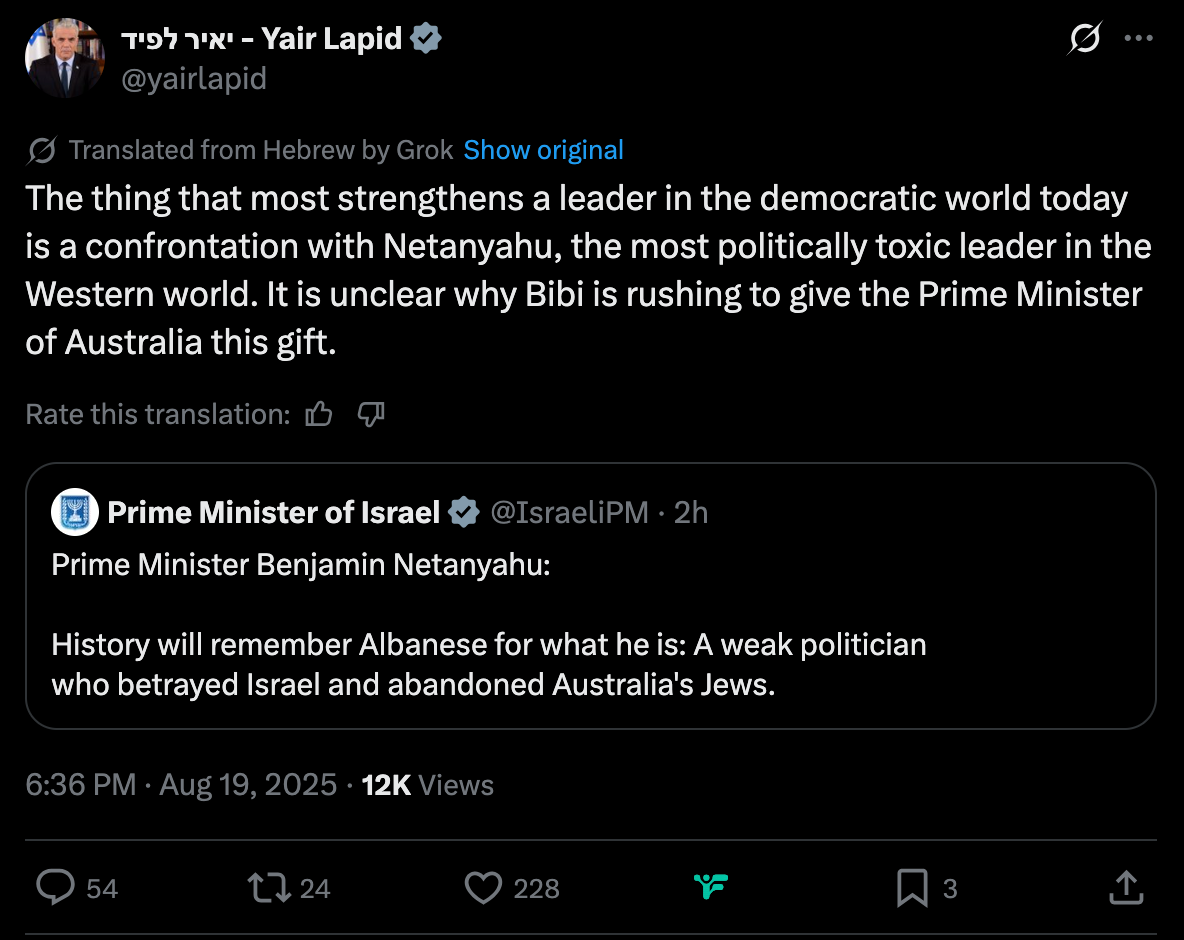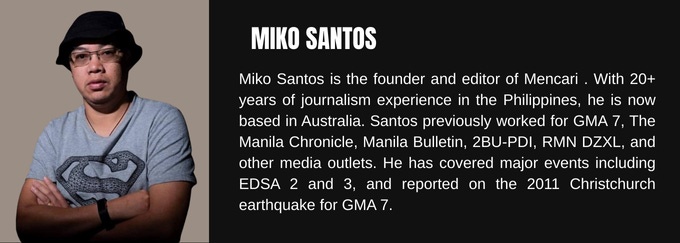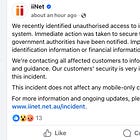Netanyahu Launches Personal Attack on Australian PM as Diplomatic Crisis Deepens
Today’s email is brought to you by Empower your podcasting vision with a suite of creative solutions at your fingertips.

Israeli Prime Minister Benjamin Netanyahu accused Australian Prime Minister Anthony Albanese of betraying Israel and abandoning Australian Jews in an extraordinary personal attack Tuesday, marking a dramatic escalation in the worst diplomatic crisis between the two countries since Israel's founding.
"History will remember Albanese for what he is: a weak politician who betrayed Israel and abandoned Australia's Jews," Netanyahu wrote on social media platform X, delivering an unprecedented public rebuke of a democratic ally's leader.
The inflammatory comments triggered immediate criticism from across Israel's political spectrum, with opposition leader Yair Lapid condemning Netanyahu's approach as counterproductive.
"The thing that strengthens a leader in the democratic world today most is a confrontation with Netanyahu, the most politically toxic leader in the Western world," Lapid posted on X. "It is unclear why Bibi is in such a hurry to give the Australian Prime Minister this gift."
The personal attack represents the latest escalation in rapidly deteriorating relations between Israel and Australia, following Israel's decision Monday to revoke visas for Australian representatives to the Palestinian Authority. The move came in apparent retaliation for Australia's recent recognition of Palestinian statehood.
Australian Foreign Minister Penny Wong dismissed Israel's diplomatic expulsions as "an unjustified reaction" in a statement released Tuesday evening.
"At a time when dialogue and diplomacy are needed more than ever, the Netanyahu Government is isolating Israel and undermining international efforts towards peace and a two-state solution," Wong said.
The diplomatic row began escalating after Australian Home Affairs Minister Tony Burke cancelled the visa of Israeli Knesset member Simcha Rothman, citing social cohesion concerns. Burke's department said the decision was made on character grounds due to concerns the Israeli parliamentarian would "stir" tensions and disrupt social cohesion.
Opposition Shadow Assistant Treasurer Dave Sharma told Australian media Tuesday the bilateral relationship had reached "new depths" under the Albanese government.
"I think we have delivered insult after insult to this bilateral relationship," Sharma said. "And at times, completely unnecessarily, you can have a different position, but you can express those views respectfully. I don't think we've done that."
Sharma questioned whether Burke consulted with Foreign Minister Wong or the Prime Minister before making the visa cancellation decision.
"I just think those two statements are fundamentally at odds with one another," Sharma said, referring to government claims about valuing dialogue while preventing interaction with Israeli officials.
Truth matters. Quality journalism costs.
Your subscription to Mencari directly funds the investigative reporting our democracy needs. For less than a coffee per week, you enable our journalists to uncover stories that powerful interests would rather keep hidden. There is no corporate influence involved. No compromises. Just honest journalism when we need it most.
Not ready to be paid subscribe, but appreciate the newsletter ? Grab us a beer or snag the exclusive ad spot at the top of next week's newsletter.
Opposition Leader Susan Lee called the deteriorating relationship "something all Australians should be very sad about today."
"Israel is a liberal democracy in the Middle East and we should be supporting them as that liberal democracy," Lee told reporters in Sydney. "This is an elected member of the Israeli parliament and it's a very unusual thing to refuse a visa."
Lee said she had not seen adequate explanations from Burke about the visa refusal and questioned whether disagreeing with government policy constituted grounds for exclusion.
"Disagreeing with the Albanese government is not a reason to refuse a visa," Lee said.
Finance Minister Katie Gallagher defended the government's position during a radio interview Tuesday, saying the visa cancellation was made by the department on character grounds.
"Visas will be cancelled if it looks like you're coming here to stir, to try to disrupt and take away from some of the social cohesion which we know already is under pressure," Gallagher said.
Gallagher acknowledged the diplomatic expulsions were regrettable but maintained Australia's position on pursuing dialogue remained unchanged.
"We do regret that and we think that dialogue and opportunities for diplomacy and close discussion is really important particularly in an area like the Middle East at the moment," she said.
The minister noted similar diplomatic actions had been taken against other countries, citing Norway as an example of nations facing Israeli retaliation for Palestinian recognition.
Senator James Paterson, speaking from Melbourne, described the Australia-Israel relationship as being at its worst point since Israel's creation following World War II.
"The expulsion, effectively, of our diplomats from the West Bank is extremely regrettable," Paterson said. "It follows the decision by our Home Affairs Minister, Tony Burke, to block a visa from a visiting member of the Israeli parliament to Australia."
Paterson questioned whether proper consultation occurred before Burke's decision, asking if the Foreign Minister or Prime Minister were consulted and whether the National Security Committee of Cabinet was convened.
"This is not a decision to be taken lightly and all the implications should have been considered and it's not clear that that occurred," he said.
The Israeli politician whose visa was cancelled, Simcha Rothman, serves in Netanyahu's governing coalition and has been associated with controversial statements regarding Hamas and Palestinian territories. Australian officials cited his rhetoric as potentially inflammatory during a sensitive period for community relations.
Sharma said he had seen reports that Rothman called for the elimination of Hamas, questioning whether this constituted grounds for exclusion.
"I didn't think that was a controversial position," Sharma said. "I think the Albanese government also believes that Hamas, a listed terrorist organisation, has to be eliminated."
The diplomatic crisis unfolds against broader tensions over Australia's Middle East policy positions. Australia recently joined several European nations in recognising Palestinian statehood, a move strongly opposed by Israel.
Wong's statement Tuesday emphasized Australia's commitment to international law and human rights principles.
"Australia welcomes different races, religions and views, united by respect for each other's humanity and for each other's right to live in peace," the statement said. "We safeguard our communities and protect all Australians from hate and harm."
The statement also affirmed the government's stance against antisemitism: "The Australian Government will always take decisive action against antisemitism."
Gallagher rejected suggestions that Australia was attempting to isolate Israel, saying decisions were made based on supporting a two-state solution pathway to peace.
"We've taken some decisions about recognition of the Palestinian state based on a firm view that a two-state solution and a pathway to peace includes the recognition of the Palestinian state," she said.
The minister maintained that Australia sought diplomatic engagement despite policy disagreements.
"You know, we want diplomatic and open channels of discussion with the Israeli government," Gallagher said. "The PM takes that seriously. That's why he had those conversations."
Opposition figures suggested the crisis reflected broader failures in diplomatic management. Sharma argued Australia had isolated itself rather than Israel, noting he had not heard of similar diplomatic expulsions affecting other allied nations.
"I haven't heard of Israel rejecting or kicking out any other diplomats of any other foreign countries," Sharma said. "I haven't heard it happening to France or the United Kingdom or Canada, for instance. It seems to be happening to Australia."
The personal nature of Netanyahu's attack on Albanese represents an unusual breach of diplomatic protocol between allied democratic nations. Personal attacks between heads of government are rare and typically reserved for adversarial relationships.
Netanyahu's comments appeared designed to influence domestic Israeli politics as much as bilateral relations, with critics suggesting the confrontational approach serves his political interests during ongoing domestic challenges.
Lapid's immediate response highlighted divisions within Israeli politics over Netanyahu's diplomatic approach, suggesting the personal attack may backfire domestically.
The crisis occurs as both countries face domestic political pressures over Middle East policy. Australia's significant Jewish and Muslim communities have experienced tensions since the October 7 Hamas attacks and subsequent Israeli military response in Gaza.
Australian officials have repeatedly cited social cohesion concerns when making policy decisions related to Middle East conflicts, emphasizing the need to prevent community tensions from escalating.
Wong's statement Tuesday reiterated Australia's position that continued dialogue remains essential despite disagreements, setting up a potential test of whether diplomatic channels can be restored despite the unprecedented personal attacks.
The diplomatic breakdown threatens cooperation on broader regional security issues, including shared concerns about Iranian influence and regional stability that have traditionally united Australian and Israeli strategic interests.
As the crisis deepens, both governments face pressure to find diplomatic solutions that address domestic political considerations while preventing further deterioration in a relationship that has historically been characterized by strong cooperation and shared democratic values.
Got a News Tip?
Contact our editor via Proton Mail encrypted, X Direct Message, LinkedIn, or email. You can securely message him on Signal by using his username, Miko Santos.
Sustaining Mencari Requires Your Support
Independent journalism costs money. Help us continue delivering in-depth investigations and unfiltered commentary on the world's real stories. Your financial contribution enables thorough investigative work and thoughtful analysis, all supported by a dedicated community committed to accuracy and transparency.
Subscribe today to unlock our full archive of investigative reporting and fearless analysis. Subscribing to independent media outlets represents more than just information consumption—it embodies a commitment to factual reporting.
As well as knowing you’re keeping Mencari (Australia) alive, you’ll also get:
Get breaking news AS IT HAPPENS - Gain instant access to our real-time coverage and analysis when major stories break, keeping you ahead of the curve
Unlock our COMPLETE content library - Enjoy unlimited access to every newsletter, podcast episode, and exclusive archive—all seamlessly available in your favorite podcast apps.
Join the conversation that matters - Be part of our vibrant community with full commenting privileges on all content, directly supporting The Evening Post (Australia)
Catch up on some of Mencari’s recent stories:
It only takes a minute to help us investigate fearlessly and expose lies and wrongdoing to hold power accountable. Thanks!












